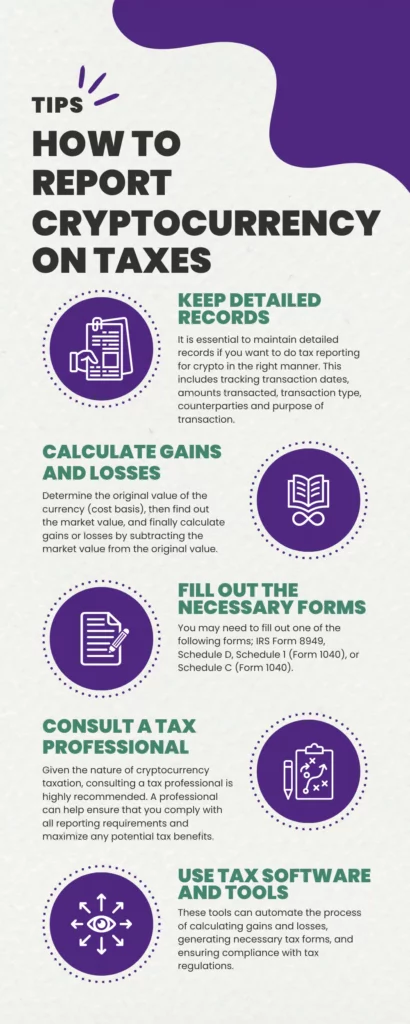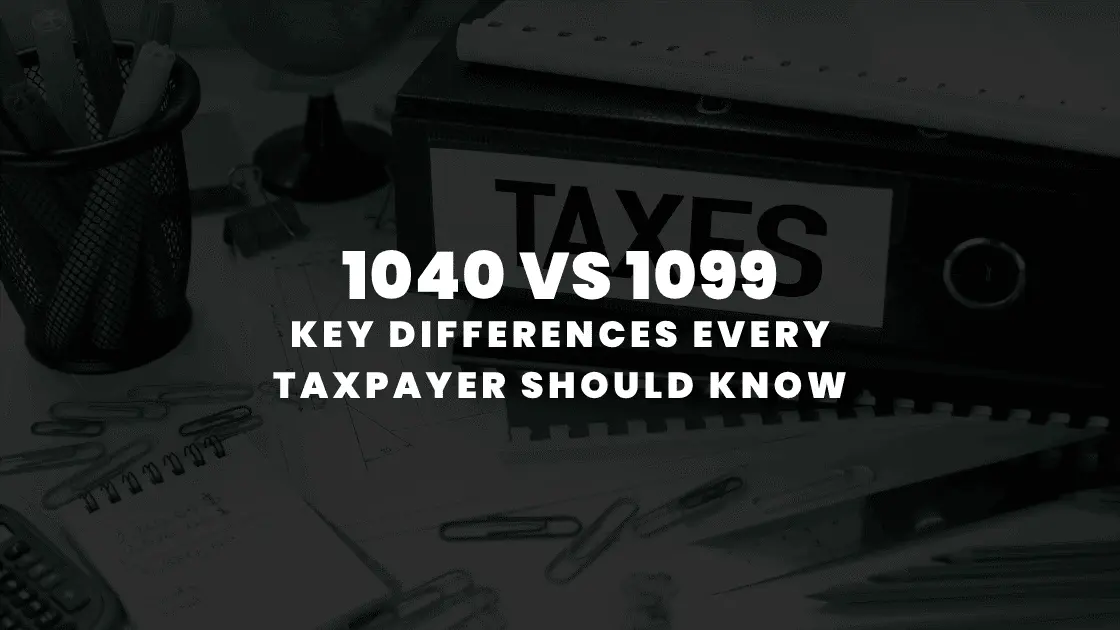August 9 2024 | By Farwah Jafri | 8 minutes Read

The Legalities of Cryptocurrency Taxation
Reporting Requirements
What Happens if You Don’t Report Cryptocurrency on Taxes?
1. Penalties and Fines
2. Interest on Unpaid Taxes
3. Audits and Investigations
4. Legal Consequences
Specific Scenarios
1. Reporting Losses
2. Small Transactions
3. Gifts and Donations
How to Report Cryptocurrency on Taxes
1. Keep Detailed Records
2. Calculate Gains and Losses
3. Fill Out the Necessary Forms
4. Consult a Tax Professional
5. Use Tax Software and Tools
Final Thoughts
Over the last two decades, cryptocurrencies have evolved beyond what any investor would have dreamed back in the early 2000s. Digital currencies have experienced an exponential growth in popularity. Parallel to that, most investors have started to wonder: What happens if you don’t report cryptocurrency on taxes?
Everyone wants a piece of the crypto cake. From seasoned professionals to casual enthusiasts, all sorts of investors seem to be chasing after digital coins today. However, the faster the growth, the more we experience rising regulatory challenges and tax implications.
Let’s understand the nature of this type of currency and what happens if you don’t report cryptocurrency on taxes.
Before diving into the consequences of not reporting cryptocurrency on your taxes, we must understand the legal framework surrounding crypto assets.
In many countries, including the United States, cryptocurrencies are treated as property for tax purposes. This means that buying, selling, or trading cryptocurrency triggers capital gains and losses, similar to transactions involving stocks or real estate.
The Internal Revenue Service (IRS) in the United States has made it clear that all cryptocurrency transactions must be reported on your tax return. This includes:
Given these requirements, many investors might wonder, “Do I have to report crypto on taxes if I lost money?” The short answer is yes. Losses on cryptocurrency transactions must be reported and can often be used to offset other gains, potentially reducing your overall tax liability.

Failing to report cryptocurrency transactions can lead to severe consequences. Here are some of the key repercussions:
The IRS imposes substantial penalties for failing to report cryptocurrency transactions. These can range from monetary fines to more severe civil penalties.
For instance, underreporting your income can result in a penalty of up to 20% of the underreported amount. In more severe cases, where tax evasion is suspected, the penalties can be much higher, including fines of up to $250,000 and potential imprisonment.
If you owe taxes on unreported cryptocurrency transactions, the IRS will charge interest on the unpaid amount. This interest accrues from the date the taxes were due until the date they are paid in full.
The longer you wait to report and pay your taxes, the more interest you will accrue, increasing your overall tax liability.
Failing to report cryptocurrency on your taxes increases the likelihood of an audit by the IRS. During an audit, the IRS will scrutinize your financial records to ensure compliance with tax laws.
If discrepancies are found, the IRS may demand additional documentation and explanations. In some cases, this can lead to a full-blown investigation, which can be both time-consuming and stressful.
In extreme cases, not reporting cryptocurrency transactions can lead to criminal charges. Tax evasion is a serious offense, and individuals found guilty can face imprisonment.
While criminal charges are typically reserved for the more serious cases of tax fraud, the possibility remains a significant risk for those who deliberately conceal their cryptocurrency transactions.
One common question is, “Do I have to report crypto on taxes if I lost money?” Yes, you must report your losses. Reporting losses can actually be beneficial as they can offset other capital gains, reducing your overall tax liability.
For example, if you have a $10,000 capital gain from the sale of stocks and a $5,000 loss from cryptocurrency trading, your net taxable gain would be $5,000. Additionally, if your losses exceed your gains, you can deduct up to $3,000 from your ordinary income ($1,500 if married filing separately) each year.
Some might wonder if small transactions need to be reported. The answer is yes. Every transaction, regardless of size, must be reported.
This includes using cryptocurrency to buy a cup of coffee or making a small trade on an exchange. While it may seem tedious, failing to report these transactions can still lead to penalties.
Giving or receiving cryptocurrency as a gift or donation also has tax implications. The donor may need to report the gift, especially if it exceeds the annual gift tax exclusion limit.
The recipient may not owe taxes at the time of receiving the gift, but they will need to report any subsequent transactions involving the gifted cryptocurrency.

Now that we’ve established the importance of reporting cryptocurrency transactions, let’s discuss how to do it properly:
It is essential to maintain detailed records if you want to do tax reporting for crypto in the right manner. Here’s what you need to document:
Now that we have determined the answer to “Do I have to report crypto on taxes if I lost money,” it is time to calculate your income. To calculate your gains and losses, follow these steps:
Example:
You bought 1 Bitcoin for $10,000 (cost basis) and later sold it for $15,000 (fair market value).
Your gain is $15,000 – $10,000 = $5,000.
Conversely, if you sold it for $8,000, your loss would be $10,000 – $8,000 = $2,000.
In the United States, cryptocurrency transactions are reported in several forms. Here’s a breakdown of what you need to fill out:
If you find yourself often coming up with questions similar to “Do I have to report crypto on taxes if I lost money,” perhaps it is time to seek some help. Given the nature of cryptocurrency taxation, consulting a tax professional is highly recommended. A professional can help ensure that you comply with all reporting requirements and maximize any potential tax benefits.
Numerous tax software programs and online tools are available to help you report cryptocurrency transactions accurately. These tools can automate the process of calculating gains and losses, generating necessary tax forms, and ensuring compliance with tax regulations. Some popular options include:
These platforms integrate with various cryptocurrency exchanges and wallets, making it easier to import your transaction data and generate accurate tax reports.
Taxation and regulation for cryptocurrencies keep changing in both their nature and extent. However, one thing is clear: getting to a point where you wonder what happens if you don’t report cryptocurrency on taxes is not worth the risk.
It is much easier to accurately report those transactions that pertain to crypto as opposed to facing the penalties, interest, audit, and legal consequences associated with the alternative. Moreover, reporting losses can provide valuable tax benefits, reducing your overall tax liability.
So, if you are wondering “Do I have to report crypto on taxes if I lost money,” the answer remains the same. Yes, absolutely. Not only is it a legal requirement, but it can also work in your favor by offsetting other gains.
Whether you have been investing for quite some time or have just begun exploring the crypto scene, it is essential that you stay informed and comply with tax regulations. By doing so, you can avoid costly mistakes and ensure that your cryptocurrency investments remain a positive and profitable part of your financial portfolio.
Subscribe for business tips, tax updates, financial fundamentals and more.
MORE BLOGS

Running a small business means every dollar matters. You work hard to earn revenue, manage expenses, and grow steadily, yet tax time often feels like money […]
Learn More →
Tax season can be overwhelming, especially when you’re staring at multiple forms with numbers instead of names. Two of the most common, and often misunderstood, are […]
Learn More →
Working extra hours can feel rewarding, after all you’re putting in more time, showing dedication, and earning more money. But when you look at your paycheck, […]
Learn More →